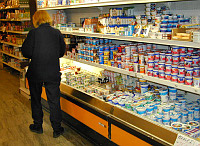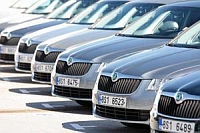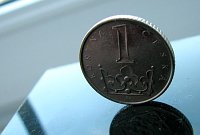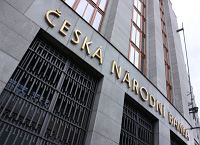Business News in Czech Republic
24.01.2013 09:21CR: In Business News this week: the Czech public debt reaches a new high; Czechs buy less food, clothes and home appliances; Albania is set to withdraw ČEZ’s licence to operate in the country; up to 40 percent of retailers violate trade regulations during post-Christmas sales; and the popular Czech butter spread will undergo an EU-enforced name change by mid 2013.Czech government approves savings measures of 8.6 billion crowns; a new pipeline opens providing alternate route for Russian gas; car maker Škoda Auto posts record sales; most Czech joint-stock companies are anonymously owned; Budvar wins major trademark battle in UK.Almost 3700 businesses had to close in 2012; the state deficit for the last year was lower than the government had expected by 4 billion crowns; online stores had big profits in December thanks to Christmas shopping; the crown may will most likely take a hit in 2013; the Czech Telecommunication Office wants to help more mobile phone operators enter the local market.
Czech public debt reached new high last year
The Czech state debt in 2012 increased by around 10 percent to reach the total of 1.688 trillion crowns, or around 86.2 billion US dollars, the Finance Ministry said. The debt is expected to exceed 43 percent of the country’s gross domestic product. Last year, the debt rose by 168 billion crowns; however, the Finance Ministry also increased its reserve for the financing of the debt by some 65 billion, mainly by issuing government bonds. The deficit of last year’s state budget reached 101 billion crowns, or 3.1 percent of GDP, down from 143 billion in the previous year.
Czechs buy less food, home appliances
November’s retail sales dropped by 1.8 percent, after a 2.2 percent surge registered in October, according to figures by the Czech Statistical Office released this week. The decrease is attributed mainly to lower sales of new cars and home appliances as well as retail sales of food, clothes and shoes, the statistical office said. New car sales stagnated over the whole of 2012, increasing by just 0.42 percent. Czechs increasingly bought cars with a lower fuel consumption and diesel engines. The share of new diesel cars sold reached 40 percent for the first time.
Albania to withdraw ČEZ’s licence
Albanian authorities announced this week that by the end of the month, they would withdraw the licence from a daughter company of the Czech power producer ČEZ to operate in the country. The move is seen as retaliation for ČEZ’s decision in November to cut electricity supplies to its non-paying Albanian customers, according to Moody’s rating agency which also said the firm’s exit from the country would cost around 5 billion dollars.
ČEZ acquired a majority stake in an Albanian power distribution company in 2009 but ran into problems last year when the Albanian regulator approved a 91% increase in electricity prices but didn’t allow the company to pass through the increase to its customers. ČEZ CEO Daniel Beneš said the company would seek international arbitration against Albania over the lost investment while the Albanian government accused ČEZ of having incurred damages of one billion dollars.
Inspection: 40 percent of retailers violate trade regulations during post-Christmas sales
Up to 40 percent of Czech retailers violated trade regulations during their post-Christmas sales, the Czech Trade Inspection said. Inspectors carried out nearly 300 checks across the country to find that in many cases, retailers provided misleading information on the prices of the goods, and often misinformed customers of the real scope of the discounts. The highest proportion of trade violations – 73 percent -was discovered in the South Bohemian and Vysočina regions, the lowest – 23 percent – in the capital. The Czech Trade Inspection will continue to monitor retail sales until the end of the month.
Popular Czech butter spread to undergo EU-enforced name change by mid 2013
The popular Czech diary product, butter spread, will undergo an EU-enforced name change by the end of the year, the Czech Agriculture Ministry said this week. The EU’s Court of Justice ruled in October the product cannot have the word butter in its name because it contains much less milk fat than required by EU legislation. The butter spread, known in Czech as pomazánkové máslo has been on the market for some 30 years. Producers will probably change the product’s name to just pomazánkové, meaning spread, although some more inventive proposals have also appeared, including “you-know-what spread”, “Barroso spread”, or “diary product known as butter spread prior to EU bureaucrats’ intervention”.
Czech government approves savings measures of 8.6 billion
The Czech government this week approved a series of spending cuts and savings measures totalling around 8.6 billion crowns. These include a plan to merge the Ministry of Transport with that of industry and trade, the sales of redundant state property and the privatization of some state-owned operations. In 2014, the government plans to save another 12 billion crowns with the aim of bringing the state budget deficit below 3 percent of gross domestic product. Last year, the budget’s deficit reached 3.1 percent of GDP.
New Gazelle pipeline opens to provide alternate route for Russian gas imports
A new pipelined named Gazelle opened in the Czech Republic on Monday to provide an alternative route for Russian gas imports. The 166-km long pipeline, whose construction cost 10 billion crowns, was built by a Czech subsidiary of the German firm RWE Transgas. It serves as link between the Czech Republic and the OPAL pipeline which is connected to the Nord Stream pipeline transporting natural gas from Russia to Germany. The new pipeline should enhance the Czech Republic’s energy security as it will no longer depend on a transit route through Ukraine which in the past was often blocked by trade disputes with Russia.
Analysis: most Czech joint-stocked companies anonymously owned
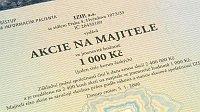
More than 53 percent of joint-stock companies registered in the Czech Republic are owned through bearer shares which means their ownership structure is non-transparent, according to analysis by the ČEKIA consultancy released this week. Firms prefer to issue bearer shares due to their simple transferability and low administrative costs, the firm said. However, bearer shares are also abused for corruption and money laundering. The Czech Republic is one of the few countries in the world that still allow this form of shares, and attempts to clamp down on them have been futile.
Škoda posts record sales for 2012
The German-owned, Czech based car maker Škoda Auto has posted record sales for 2012. The car manufacture sold 939,200 cars worldwide last year, which represents an increase of 6.8 percent compared to the previous year. Škoda’s sales grew in all markets except in western Europe; in Russia, the sales soared by 33.7 percent while China saw a 7.1 percent increase. Last month, Škoda unveiled its new Octavia model which the firm hopes will make the list of the world’s top ten best-selling cars.
Budvar wins major trademark battle in UK
The Czech state-owned beer producer Budějovický Budvar has claimed victory in a major trademark battle in the UK. Britain’s Supreme Court rejected a request by Budvar’s competitor, Anheuser-Busch Inbev, to block Budvar from selling its beer under the Budweiser trademark in the country. The ruling is the final verdict in the case. Budvar’s CEO, Jiří Boček, said the verdict was crucial for the Czech brewery given the importance of the UK market where Budvar annually sells some 80 million British pounds worth of beer. Trademark disputes between Budvar and its rival continue in another 11 countries around the world.
Small businesses take a hit in 2012
The past year was not an easy one for entrepreneurs. Almost 3,700 businesses went under during 2012, a large portion of which were companies working in the construction sector. According to the Czech Credit Bureau, 47% more businesses and independent entrepreneurs had to close shop last year than in 2011. The highest number of bankruptcies was in the Moravian-Silesian region, while Prague took second place with 479 businesses closing down in the course of the year. As for 2013, the Czech union of small and medium-sized businesses has said that they expect the revenues of the smaller entrepreneurs to stagnate in 2013.
State deficit less than expected
The state coffers, though, did not end the year too badly. The deficit for 2012 has been calculated at 101 billion crowns, as compared to the 105 billion deficit the government had predicted. The Finance Ministry credits this success to the increase in VAT and government spending cuts of 47 billion. The opposition, though, claims that the finance ministry achieved this by moving some items from the state budget to the public one. In 2011, the deficit was much higher at more than 142 billion crowns, but next year the finance minister has promised to scale the deficit down to 100 billion.
Online Christmas shopping flourishes
Online stores report high profits over Christmas. According to the estimates of one of the biggest price-comparison sites Heureka.cz Czechs spent around 17 billion crowns shopping on the internet. For some online stores the revenues this December were more than 40% higher than at the same time in 2011. The most common gifts purchased online were electronic books and tablets. Now both on and offline stores are waiting for money to start rolling in from the traditional post-holiday sales that began this week.
Foreign banks expect CNB to weaken crown in 2013
With interest rates now close to nil, the Czech National Bank may try to help the export-oriented economy to recover from the recession by helping to weaken the crown. The CNB board voted in mid-December to keep the interest rates at 0.05%. A number of large foreign investment banks like Morgan Stanley and Bank of America have also said that they expect the exchange rate of the crown to the euro to drop to a three-year low in 2013, which is why selling the crown will be one of the main trading moves of the year.
ČTÚ: Telecommunication market needs to have more competition
The Czech telecommunication Office announced in December that it intends to place more regulations on mobile phone operators in order to improve competition in mobile services in the country. They found the current operators on the market are colluding to a certain extent and have been preventing new operators from entering the field. The telecommunication regulator wants to make it easier for the so-called virtual operators to enter the Czech market. These operators would lease network capacity from the giants T-Mobile, Telefonica and Vodafone. The measure should help to decrease prices for the customers, which are considerably higher than in most other European countries.
———
Zpět

